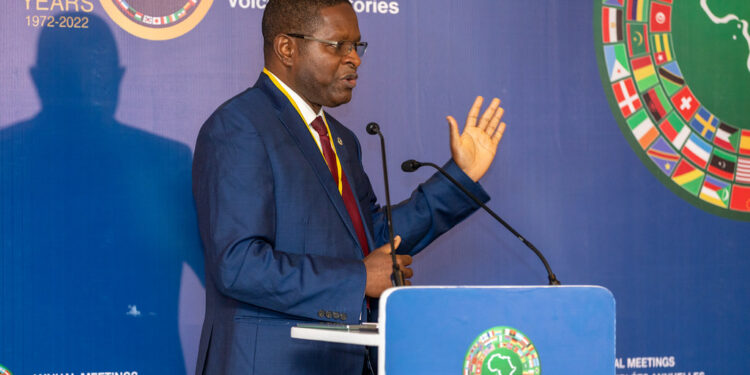adverts
Prof. Kevin Urama, Chief Economist and Vice President for Economic Governance and Knowledge Management at the African Development Bank (AfDB), has disclosed that African nations will require $74 billion in 2024 to meet their debt obligations.
Speaking at the launch of the Debt Management Forum for Africa (DeMFA) in Abuja on Monday, Prof. Urama outlined the growing financial burden facing the continent. The event, themed “Making Debt Work for Africa: Policies, Practices, and Options,” brought together policymakers and stakeholders to discuss the continent’s debt challenges.
Urama highlighted the stark rise in Africa’s debt servicing costs, which have ballooned from $17 billion in 2010 to $74 billion in 2024. Of this total, $40 billion (54%) is owed to private creditors, reflecting a growing reliance on private capital markets.
adverts
“According to the African Economic Outlook Report (AEO) 2024, African countries are expected to spend around $74 billion on debt service in 2024, up from $17 billion in 2010. Of this, $40 billion is owed to private creditors,” Urama stated.
He further cautioned that the figure could be underestimated due to hidden debts and contingent liabilities. Currently, 20 African nations are either in debt distress or at high risk, with refinancing risks mounting due to significant bullet repayments.
Urama contrasted the ability of developed nations to sustain high debt levels with the struggles faced by African economies.
“Developed nations can manage high levels of debt with low servicing burdens, while developing countries, especially in Africa, are allocating an increasing proportion of fiscal resources to debt repayment,” he said.
He criticized the slow and ineffective nature of global debt relief mechanisms, which fail to address the structural issues that undermine Africa’s debt sustainability. Annual debt refinancing needs for African countries are projected to reach $10 billion between 2025 and 2033.
Urama also cited the increasing cost of borrowing for African nations. In 2023, African Eurobond yields surged to 15%, more than twice the 7% average seen in 2019, exacerbating the challenges of debt refinancing.
A significant burden highlighted by Prof. Urama is the so-called “Africa Risk Premium”, which costs the continent an estimated $24 billion annually in excess interest payments due to inflated risk perceptions.
“This deprives Africa of critical resources for development and undermines growth prospects,” Urama explained.
He called for Africa-led solutions to address the debt crisis, including rethinking borrowing models and prioritizing investments in productive sectors.
Dr. Anthony Simpasa, Director of the Macroeconomic Policy, Forecasting, and Research Department at AfDB, attributed much of Africa’s rising debt to climate change.
“Many countries, particularly those vulnerable to climate shocks, have had to borrow heavily to finance climate-related projects. Adaptation and mitigation projects dominate climate financing on the continent,” Dr. Simpasa noted.
Ms. Allison Holland, Assistant Director of the Strategy, Policy, and Review Department at the International Monetary Fund (IMF), emphasized the importance of prioritizing private-sector debt resolution before involving public-sector creditors.
“Why don’t we move forward with the private sector first? Wouldn’t this be faster?” she asked.
Holland noted that IMF interventions often hinge on the willingness of official creditors to participate. “If the private sector is unable to restore debts, the IMF is restricted from moving forward,” she added, underscoring the critical role of official creditors in the debt resolution process.
The forum underscored the urgent need for a comprehensive approach to Africa’s debt challenges, combining innovative debt management strategies with reforms to improve global financial systems. The AfDB and other stakeholders are advocating for fairer risk assessments and increased investment in Africa’s economic resilience to ensure long-term debt sustainability.
Prof. Urama concluded by reiterating the need for structural reforms and enhanced international cooperation to tackle the root causes of Africa’s debt crisis.


